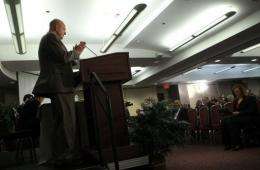WikiLeaks scandal sparks US intelligence reform

The WikiLeaks document dump, which saw hundreds of thousands of classified US files leaked, rattled US intelligence officials, forcing them to implement reforms to prevent another such breach.
James Clapper, director of national intelligence, said changes were being put in place over the next five years that would create a new security "architecture," making it infinitely harder to disclose America's secrets.
The "terrible event," which saw sensitive US diplomatic and military cables exposed for public scrutiny, "caused us to make some changes," Clapper told a Washington think-tank, acknowledging the "challenge" ahead.
"We have to do more to protect data and ensure that the information we are giving is actually going to an authorized recipient," he said.
Chief among the changes are improvements in "labeling," and digital "tagging" of diplomatic cables, Clapper said during remarks at the Center for Strategic and International Studies.
At the same time, he said, US officials are eager to ensure information that is intended to be shared can be disseminated without major additional hurdles.
Clapper added that the effort aims to protect US secrets not only from outside enemies, but from actors with the system who do not have specific authorization to distribute sensitive US cables and files.
"Frankly we always had responsibility for detecting insider threats. What WikiLeaks has obviously done is heighten our sensitivity about that," he said.
The controversial anti-secrecy WikiLeaks website began releasing US military documents in July 2010. It dumped the entire archive of diplomatic documents in September 2011, causing huge embarrassment to Washington.
A US military tribunal's investigating officer earlier this month recommended that army private Bradley Manning be court-martialed for allegedly funneling hundreds of thousands of classified US documents to WikiLeaks.
Manning, a specialist in US intelligence systems, served in Iraq from November 2009 until his arrest the following May.
He is accused of turning over to WikiLeaks a massive trove of US military reports from Iraq and Afghanistan, some 260,000 classified State Department cables, Guantanamo detainee assessments and videos of US air strikes.
The fact that an Army private could have had access to so much sensitive information has posed a challenge for the intelligence community, amid accusations that data-sharing went too far after the September 11 attacks.
At that time, the community was accused of holding back information that could have been used to prevent the strikes on New York and Washington. After 9/11, inter-agency sharing of classified data increased.
The September 11 attacks "emphasized the need to share" information, said Eric Velez-Villar, deputy assistant director of the FBI, saying that proper information-sharing "can save lives."
Clapper added: "The goal, of course, is to find that nirvana between the responsibility to share and the need for protection."
Corin Stone, an assistant director of national intelligence for policy and strategy, said, "Basically, we seek to restore confidence."
The WikiLeaks scandal has "fundamentally broken trust" in the intelligence community, Stone said. "To restore confidence, we must strengthen security in sharing information."
David Shedd, deputy director of the Defense Intelligence Agency, said intelligence services are trying to manage a "tsunami of data" that forces them to ask themselves how to "process that enormous data flow."
Paul Kshemendra, who was appointed by President Barack Obama in 2010 to head the federal program on intelligence sharing, agreed that the "ocean" of data is growing.
"You need to put a signal in that ocean of noise," he said.
(c) 2012 AFP



















